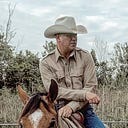If there is one thing that defines a cowboy, it’s the jingle-jangle of his spurs “singing.” Yes, the western spur sings with a distinctive cling-clanggg that lets everyone ‘round know there is a cow puncher approaching. And, to most any person raised in the city, the cowboy’s jingling spur rowels might appear to be pure pretension, but the spurs to which they are attached are a very necessary part of his equipment. Not that the cowboy doesn’t enjoy the jingle, mind you.
But, what of these pieces of metal strapped to the boot of the iconic American cowboy? From where did they come, and for what is their purpose? Well, my friend, for the answer to these questions about the western spur, read on.
What is a spur?
A spur is a metal tool designed to be worn in pairs on the heels of riding boots for the purpose of directing a horse or other animal to move forward or laterally while riding. It is usually used to refine the riding aids (commands) and to back up the natural aids of the leg, seat, hands, and voice. This very old word derives from the Anglo-Saxon spura, and spora, to the Medieval High German sporn, and then the modern Dutch spoor, all of which mean “to kick.” As centuries passed, the generalized sense of “anything that urges on as a stimulus” has been known as a spur since at least 1390.
